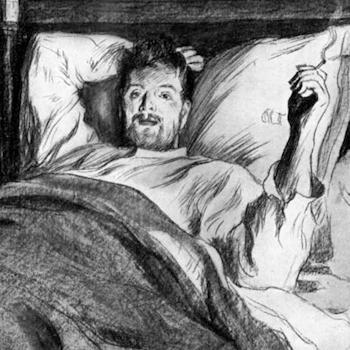For years, waking up in the morning was a real gamble. Would I have a pounding migraine or wouldn't I?* I remember thinking (sometimes out loud), "What's the point of sleeping if I feel so awful in the morning?"
People offered me various suggestions. Go to bed earlier. Exercise. No alcohol before bed. Less caffeine during the day. Use a different pillow. No matter what I did, nothing changed.
A few years ago, my general practitioner suggested that I have sleep apnea. I snored. I had low energy during the day. I had a ton of migraines. It made sense. But I didn't want to endure a sleep study, and I really didn't want to wear some sort of head gear to bed. So I put it off... until I just couldn't take it anymore.
So, I somnambulated my way to a sleep clinic in Seattle. They set me up with an at-home sleep study (the medical term is polysomnography) that measured my blood oxygen levels and recorded the number of times per hour that my breathing stopped or was disrupted, known as the apnea-hypopnea index (AHI). The test results showed (if I recall correctly) that I had 14 events per hour, which is close to moderate sleep apnea. The sleep specialist suggested CPAP therapy.
CPAP, which stands for continuous positive airway pressure, is a therapy that utilizes a machine that blows air into your nose and/or throat when it detects that your breathing has stopped. In other words, it prevents sleep apnea. For me, the device lowered the number of events per hour from 14 to fewer than 2. On some nights, it's fewer than 1 event per hour.
And my migraines? Well, they didn't go away entirely, but they vastly improved. It is now relatively uncommon for me to wake up with a migraine. While I understand that I'm merely a sample size of n = 1, in my mind, this was definitive proof that my migraines were linked to poor sleep. That's why I don't believe the conclusion of a new study in the journal Neurology that claims there is no link.
Study Claiming No Link Between Poor Sleep and Migraines Has Major Shortcomings
The paper was based on a study with the following design:
In this prospective cohort study of 98 adults with episodic migraine, participants completed twice-daily electronic diaries on sleep, headaches, and other health habits, and wore wrist actigraphs for 6 weeks.
There are several major shortcomings. First, self-reported diaries are probably not accurate. If I had been asked about the quality of my sleep, I would have rated it "good." I wasn't even aware that I snored or had trouble breathing.
Second, wrist actigraphy is not an adequate substitute for polysomnography; the former basically measures movement, while the latter provides details on blood oxygenation and breathing disruption.
Third, the authors should have performed an experiment (e.g., randomizing half of the participants to receive CPAP therapy) rather than conducting an observational study. Experiments are more informative and the conclusions drawn from them far more substantiated.
Obviously, poor methodology can produce results that don't make any sense.
*Note: A smart commenter below noted that I may be conflating sleep apnea-induced headaches with migraines. My headaches respond to triptans, which makes me think they are indeed migraines. But I used to get so many headaches that it's difficult for me to tell the difference between a regular headache and a migraine.
Source: Suzanne M. Bertisch, et al. "Nightly sleep duration, fragmentation, and quality and daily risk of migraine." Neurology. Published: 16-Dec-2019. DOI: 10.1212/WNL.0000000000008740




